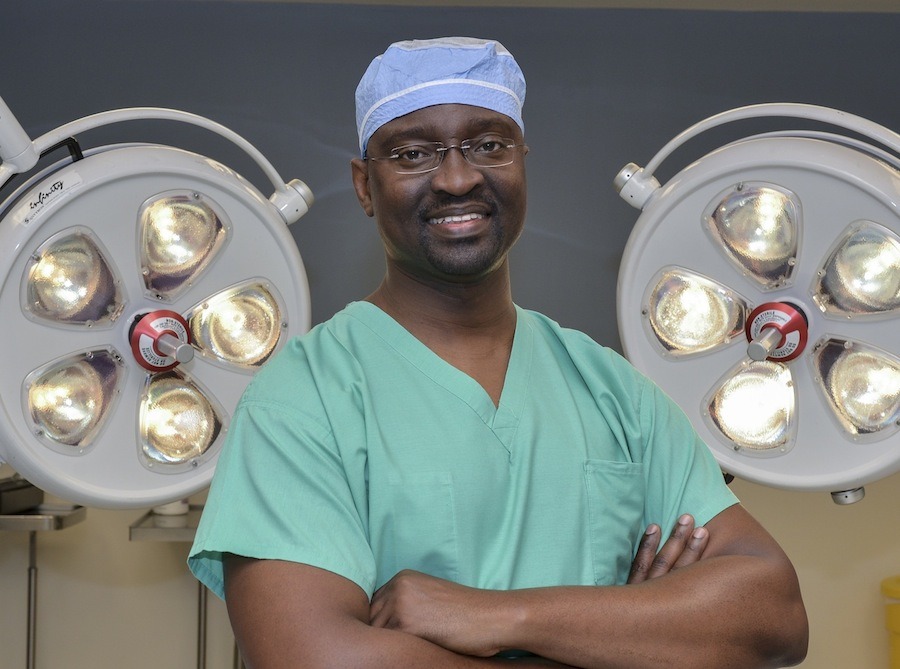 None of us wants to go under the knife, but sometimes it’s the most practical option to achieve the desired outcome.
None of us wants to go under the knife, but sometimes it’s the most practical option to achieve the desired outcome.
But if you’re facing an operation these days, chances are good that you may be able to have a minimally invasive laparoscopic surgery (just 4 tiny incisions, less pain and blood loss, quicker recovery) which will get you back on your feet faster than you expect!
Board certified and fellowship trained NJ surgeon Dr. Seun Sowemimo has successfully performed hundreds of general, laparoscopic and bariatric surgeries at central New Jersey hospitals and surgicenters located in Freehold, Holmdel and Old Bridge.
We asked Dr. Seun to share his personal recommendations on how best to prepare before undergoing an operation. He was happy to oblige with these patient pre-op recommendations.
1. Don’t put off your operation.
Don’t wait too long to schedule your procedure. If you have been recommended for surgery, the medical issue is not going to go away on its own, unfortunately.
Delaying surgery can allow your condition to worsen, which can increase your risk of surgical complications and potential damage to vital organs.
2. Follow pre-surgery prep instructions.
Surgery puts stress on the body, so the stronger you are physically, the faster you will recover. Be sure to get enough sleep, eat a healthy diet, and if you smoke, stop at least two weeks prior to your surgery.
Closely follow your surgeon’s directions when it comes to taking or stopping medications before your operation.
3. Understand possible surgical complications.
In even routine surgeries — gallbladder removal, appendectomies, ventral hernias, inguinal hernias, diverticular issues — post-surgical- and anesthesia-related complications are possible.
Successfully managing your operation includes being well-informed. A qualified surgeon will discuss the most common complications, how to recognize them, what to do, and when you should call your doctor once you are recovering at home.
4. Appoint your own personal patient advocate.
While you’re in the hospital, a spouse, family member or good friend should be on hand to assist you or answer short-term questions the hospital team may need to know
In addition, once you are released, someone needs to watch over you for at least the next 48 hours on a 24/7 basis until you are up and around independently.
5. Stay in communication with your surgeon, nurses and hospital team after discharge.
Studies show that when your caregiver stays in touch with your surgical team during the post-operative recovery period, you’re less likely to have serious complications.
6. Give yourself time to rest and recover.
Surgery is a shock to the body and it needs time to “reboot,” even for younger patients. Your body needs rest, first and foremost. Follow doctor’s instructions about returning to eating and sleeping routines.
Don’t go back to work before your doctor clears you to do so, particularly if you have a physical job.
“One of my patients who is a mail carrier went back to work after colon surgery before she had come in for her final post-op visit,” recalls Dr. Seun. “She subsequently encountered a complication while on the job that required hospital re-admission.” Dr. Seun said she was released a few days later, but her recovery time was twice as long.
Take it easy, have others help out with cooking, cleaning, and other chores and recognize that returning to “normal” will take some time.
“Think of it this way,” says Dr. Seun. “Your surgery marks the start of a new normal — a healthier one if you follow your team’s advice before and after the operation.”
About Dr. Seun Sowemimo, MD, FACS
Dr. Seun is a top NJ bariatric surgeon and the medical director at Prime Surgicare, with offices in Freehold serving Monmouth and Ocean counties. He is board-certified, Columbia and Yale University fellowship-trained in advanced laparoscopic, bariatric and general surgery.
To learn more, visit his YouTube channel or call Prime Surgicare at (732)-982-2002.
